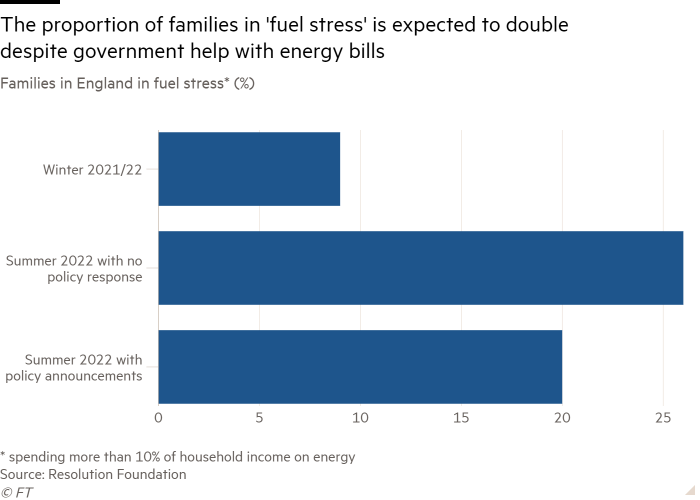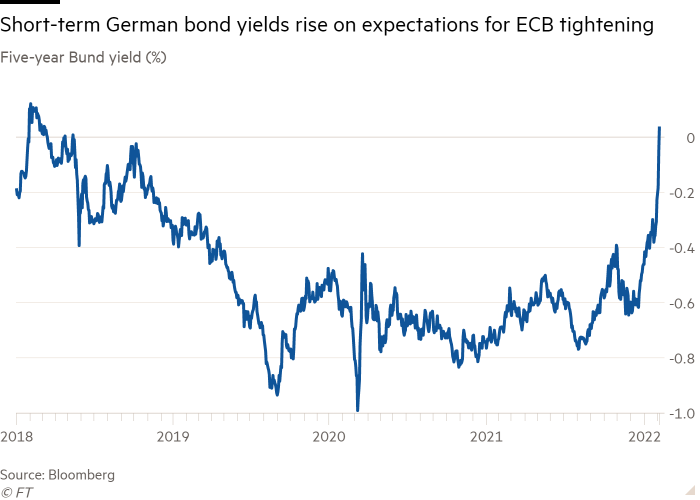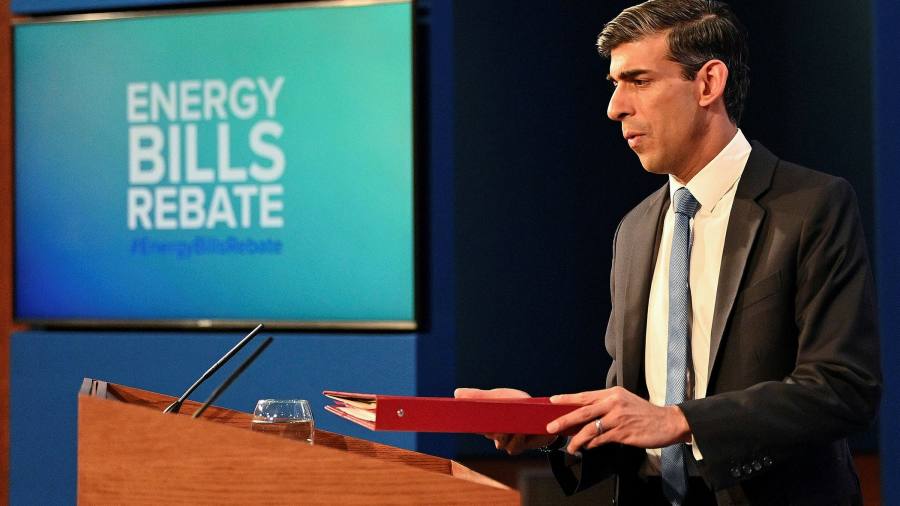This article is an on-site version of our The Road to Recovery newsletter. Sign up here to get the newsletter sent straight to your inbox three times a week
Good evening,
Today’s proposed reforms from the UK energy regulator to help households with crippling fuel bills ends a week in which the country’s cost of living crisis moved centre stage and in doing so added to the political crisis for the Johnson government.
Ofgem wants to adjust the price cap for domestic electricity and gas bills more regularly and toughen rules on suppliers to avoid more of them falling into financial distress, leaving consumers shouldering some of the costs. More than half of the country’s suppliers have gone bust since August.
Today’s proposals follow Ofgem’s announcement yesterday that the fuel price cap would rise by 54 per cent to almost £2,000 a year from April, leaving Britons with their highest energy bills in a decade — read our explainer on who will be affected most by the rises.
UK chancellor Rishi Sunak announced a £9bn package of aid in response, but was accused of a “conjuring trick” due to offering consumers a £200 discount in October when the price cap is expected to jump again.
The FT Editorial Board gave the plan a muted welcome, but argued it should be better targeted. With the proposals predicated on energy prices eventually falling, the chancellor’s moves are unlikely to be the last time the government needs to intervene, it says.

Some politicians have called for a windfall tax on companies that have benefited from the surge in oil and gas prices, a move rebuffed by Shell yesterday, even as it reported bumper earnings of $19.3bn for 2021, up from $4.8bn a year earlier, alongside an increased dividend.
The Bank of England, which raised interest rates to 0.5 per cent yesterday, said households were facing the worst squeeze on disposable income for 30 years, as inflation heads for 7.5 per cent while taxes and unemployment rise. BoE governor Andrew Bailey did not make himself popular by suggesting that workers should not ask for big pay rises to try and stop prices spiralling.
The central bank also cut its UK growth forecast for this year from 5 per cent to 3.75 per cent and said the economy would fall back to a “subdued” rate of just 1 per cent growth in the medium term. Concerns over a low-growth, high-tax future were also voiced by the CBI, the country’s largest business group, in a report on Monday calling for “radical policy shifts”.
FT economics editor Chris Giles describes the outlook for the UK as “pretty grim” despite efforts by the government to paint the country as the fastest growing economy in the G7. “A true and fair view shows an internationally mediocre UK economic recovery with a significant deterioration in prospect,” he concludes.
Latest news
-
Cruise holiday operator Royal Caribbean said the fallout from the Omicron outbreak would delay its return to profitability
-
UK homebuyers paid more stamp duty in the last three months of 2021 than in any quarter on record, sending nearly £3bn to the Treasury
-
Canada shed 200,000 jobs in January, pushing up the unemployment rate by half a percentage point to 6.5 per cent, as new restrictions hit business activity
For up-to-the-minute news updates, visit our live blog
Need to know: the economy
The US added a much better than expected 467,000 jobs in January, with upward revisions to previous months, highlighting the strength of the labour market recovery, despite record numbers of Covid-19 infections from the Omicron variant. The unemployment rate edged up from 3.9 per cent to 4 per cent.
European government bonds were hit by a wave of selling, as traders bet that the European Central Bank would take a more aggressive stance against inflation. The shift in mood followed hawkish comments from ECB chief Christine Lagarde, fuelling investors’ belief that a series of increases were on the way. The FT’s Frankfurt bureau chief Martin Arnold explains the reasons for the change in tone.

Latest for the UK and Europe
Despite pessimism over the UK’s economic outlook, there was better news for the construction industry, where activity grew at its fastest rate in six months as supply chain problems eased, according to new PMI data. Shaftesbury, a key landlord in London’s West End, issued a bullish forecast on the area’s future, although footfall data suggest many stores are still struggling.
The PMI construction reading for the eurozone was even more optimistic than the UK’s. Sharp increases in housebuilding and a bounceback in civil engineering projects drove the fastest monthly expansion of activity since January 2018.
Measures to curb temporary labour contracts in Spain in order to unlock EU recovery funds squeaked through after a member of the centre-right opposition party voted in error.
Global latest
New Zealand, which has had one of the strictest border regimes in the world, is set to reopen. Polling data and the experience of New Zealanders stranded aboard suggest support for Prime Minister Jacinda Ardern’s policies is waning.
Undercover Economist Tim Harford examines why “real inflation” is so hard to measure and the steps needed to better understand how price rises affect different groups of people.
Watch our new video on political risk and the changing dynamics of investing in China, featuring global China editor James Kynge and markets editor Katie Martin.
Need to know: business
Amazon shares surged on Friday after the tech company announced a 17 per cent price rise for its Prime service and strong growth in cloud computing in its earnings statement. However, the company forecast lower than expected sales for the current quarter because of strains, including staff absences caused by coronavirus.
Carlsberg, the world’s third-largest brewer, said it would increase beer prices to cover rising costs. The owner of brands such as Tuborg and Kronenbourg 1664 said sales last year had passed pre-pandemic levels, but that it expected cost inflation and the effects of Covid-19 to be a burden on its business this year.
Infineon, Europe’s largest chipmaker, said sales rose by a fifth in the final quarter as the semiconductor shortage intensified. The German group, whose biggest customers are carmakers, also raised revenue forecasts for the current year. A fierce battle has broken out in Brussels over how to boost the EU chip industry.
Semiconductor shortages were one of the reasons for Ford’s lower than expected 2021 profits of $10bn, but the company said higher pricing could lift earnings by as much as 25 per cent this year. Public subsidies on the development of electric cars are sparking manufacturing investment across the US.
Science round up
Pandemic management: The World Health Organization’s European arm said Covid-19 deaths in the continent were beginning to plateau, despite weekly infections hitting 12mn — the highest number since the pandemic began.
The world’s first study in which volunteers were deliberately infected with Covid-19 found that people started to develop symptoms and become infectious after just two days — much quicker than expected.
Trust in government — of whatever stripe — leads to lower Covid-19 infection rates, according to a study that found high levels of rule compliance and vaccine take-up in Nordic and East Asian countries.
Read our special report, Combating Pandemics, on the lessons learned from Covid that could help mitigate future crises.
Omicron developments: Omicron sub-variant BA.2 is more infectious than its sister strain and has now been detected in 57 countries. Here is our latest explainer.
Vaccines: Pfizer and BioNTech submitted data to US regulators for authorisation of their vaccine for young children. Sanofi said it was still working on its long-delayed Covid jab, aiming for trials to be completed in the first quarter, adding that it would be useful as a booster despite arriving much later than rivals’ attempts.
Treatments: Japan’s Shionogi shared positive trial results for its Covid-19 pill.
Covid cases and vaccinations
Total global cases: 378.6m
Total doses given: 10.2bn
Get the latest worldwide picture with our vaccine tracker
And finally . . .
Fed up with Zooming from a cramped apartment? Why not buy your own island, complete with a villa, for a ridiculously cheap $104,000? There is one slight catch though — you can’t actually live in it because it only exists online. Welcome to the metaverse housing market.

Thanks very much for reading The Road to Recovery. We’d love it if you shared this newsletter with friends and colleagues who might find it valuable, so please do forward it. And if this was forwarded to you, you are very welcome to sign up and enjoy it — and access to all of the FT — free for 30 days. Please sign up here.
Please also share your feedback with us at [email protected]. Thank you


